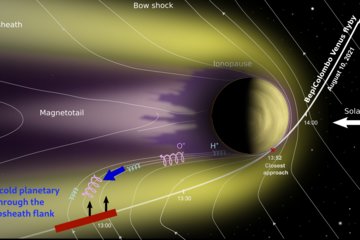All genres
161.
Journal Article
Simulating acoustic waves in spotted stars. Astronomy and Astrophysics 577, A145 (2015)
162.
Journal Article
Rotation, differential rotation, and gyrochronology of active Kepler stars. Astronomy and Astrophysics 583, A65 (2015)
163.
Journal Article
The EChO science case. Experimental Astronomy 40, pp. 329 - 391 (2015)
164.
Journal Article
A new correction of stellar oscillation frequencies for near-surface effects. Astronomy and Astrophysics 568, A123 (2014)
165.
Journal Article
A new correction of stellar oscillation frequencies for near-surface effects (Corrigendum). Astronomy and Astrophysics 569, C2 (2014)
166.
Journal Article
The radial gradient of the near-surface shear layer of the sun. Astronomy and Astrophysics 570, L12 (2014)
167.
Journal Article
Seismic analysis of HD 43587Aa, a solar-like oscillator in a multiple system. Astronomy and Astrophysics 564, A34 (2014)
168.
Journal Article
Physical causes of solar cycle amplitude variability. Journal of Geophysical Research: Space Physics 119, pp. 680 - 688 (2014)
169.
Journal Article
Asteroseismic Fundamental Properties of Solar-type Stars Observed by the NASA Kepler Mission. Astrophysical Journal, Suppl. Ser. 210, 1 (2014)
170.
Journal Article
Comparison between Mg II k and Ca II H images recorded by SUNRISE/SuFI. Astrophysical Journal 784, 20 (2014)
171.
Journal Article
Seismic constraints on the radial dependence of the internal rotation profiles of six Kepler subgiants and young red giants. Astronomy and Astrophysics 564, A27 (2014)
172.
Journal Article
Generalization of the noise model for time‐distance helioseismology. Astronomy and Astrophysics 567, A137 (2014)
173.
Journal Article
Magnetic Flux Transport at the Solar Surface. Space Science Reviews 186, pp. 491 - 523 (2014)
174.
Journal Article
Time-distance helioseismology: A new averaging scheme for measuring flow vorticity. Astronomy and Astrophysics 570, A90 (2014)
175.
Journal Article
Image compression in local helioseismology. Astronomy and Astrophysics 571, A42 (2014)
176.
Journal Article
Interpreting the Helioseismic and Magnetic Imager (HMI) multi-height velocity measurements. Solar Physics 289 (9), pp. 3457 - 3481 (2014)
177.
Journal Article
Rotational splitting as a function of mode frequency for six Sun-like stars. Astronomy and Astrophysics 568, L12 (2014)
178.
Journal Article
Propagating Linear Waves in Convectively Unstable Stellar Models: a Perturbative Approach. Solar Physics 289, pp. 1919 - 1929 (2014)
179.
Journal Article
The PLATO 2.0 mission. Experimental Astronomy 38, pp. 249 - 330 (2014)
180.
Journal Article
Structure and evolution of solar supergranulation using SDO/HMI data. Astronomy and Astrophysics 567, A138 (2014)











